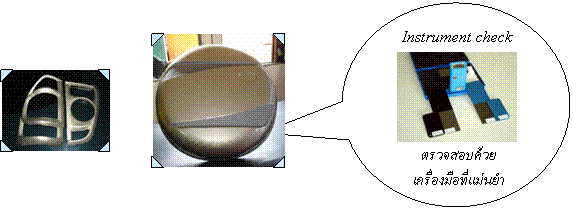- Silver
- สมาชิกระดับ Silver
- ฟรี
- สามารถเข้าถึงข้อมูลข่าวสารขั้นพื้นฐานได้
- ข้อมูลผู้ประกอบการต่างประเทศ
- ข้อมูลสถิติในประเทศและต่างประเทศ
- มาตรการทางการค้าระหว่างประเทศ
- กฎ ระเบียบ นโยบายในประเทศ
- เทคโนโลยี และงานวิจัย
- สมัครสมาชิก
ค้นหาข้อมูล
ความเคลื่อนไหวในอุตสาหกรรม
- รายละเอียด
- หมวด: ความเคลื่อนไหวในอุตสาหกรรม
- อ่าน: 3472 ครั้ง
- รายละเอียด
- หมวด: ความเคลื่อนไหวในอุตสาหกรรม
- อ่าน: 4940 ครั้ง
- รายละเอียด
- หมวด: ความเคลื่อนไหวในอุตสาหกรรม
- อ่าน: 3400 ครั้ง
นายเจน นำชัยศิริ ประธานสภาอุตสาหกรรมแห่งประเทศไทย (สอท.) เปิดเผยผลสำรวจดัชนีความเชื่อมั่นของภาคอุตสาหกรรมไทยเดือนตุลาคม 2560 ที่ผ่านมา อยู่ที่ 85.9 ลดลงจากเดือนก่อนอยู่ที่ 86.7 เนื่องจากผู้ประกอบการเห็นว่ากิจกรรมทางเศรษฐกิจและการใช้จ่ายภายในประเทศชะลอตัวลง เมื่อเทียบกับเดือนก่อนหน้านี้ ประกอบกับฝนตกจนเกิดน้ำท่วมในหลายพื้นที่ ขณะเดียวกันในเดือนตุลาคม ยังมีวันทำงานน้อยกว่าเดือนก่อนหน้า ขณะที่ภาคเอกชนเองก็ติดตามปัจจัยการเมืองเรื่องปรับ คณะรัฐมนตรี (ครม.)ว่าจะมีการเปลี่ยนแปลงรัฐมนตรีตำแหน่งใด และนโยบายจะมีการเปลี่ยนแปลงหรือไม่ “แม้เดือนตุลาคมความเชื่อมั่นจะลดลง แต่เชื่อว่าตั้งแต่เดือนพฤศจิกายนเป็นต้นไป ความเชื่อมั่นจะดีขึ้น เพราะเริ่มเห็นสัญญาณราคาสินค้าเกษตรปรับตัวดีขึ้น ซึ่งจะมีส่วนกระตุ้นกำลังซื้ออย่างมากขณะเดียวกันยังมีมาตรการช้อปช่วยชาติ ปัจจัยเหล่านี้จะส่งผลดีต่อเศรษฐกิจช่วงปลายปีต่อเนื่องถึงปี 2561 แน่นอน” นายเจน กล่าว ด้าน นายสุรพงษ์ ไพสิฐพัฒนพงษ์ รองประธานและโฆษกกลุ่มอุตสาหกรรมยานยนต์ สอท. กล่าวว่ายอดผลิตรถยนต์ในเดือนตุลาคม 2560 ที่ผ่านมาอยู่ที่ 163,487 คัน เพิ่มขึ้นจากช่วงเดียวกันของปีก่อน 1.48% จากการผลิตรถกระบะเพื่อส่งออก 57,599 คัน เพิ่มขึ้น 6.16% และยอดผลิตรถยนต์นั่งเพื่อจำหน่ายในประเทศ 37,810 คัน เพิ่มขึ้น12.63% ส่งผลให้ยอดผลิตรถยนต์ 10 เดือน (มกราคม-ตุลาคม) มี 1,641,231 คัน เพิ่มขึ้น 0.21%
ที่มา : หนังสือพิมพ์ แนวหน้า วันที่ 23 พฤศจิกายน 2560
- รายละเอียด
- หมวด: ความเคลื่อนไหวในอุตสาหกรรม
- อ่าน: 3654 ครั้ง

หลังการทำ Primer มุ่งเน้นให้ตรวจสอบความเรียบร้อย

ต้องตรวจดูว่ามีปัญหาอะไรบ้าง เช่น โป๊วสีเก็บไม่ละเอียด, เกิดตามด, มีฟองอากาศหรือมีเม็ดฝุ่น สิ่งเหล่านี้หากตรวจสอบพบควรรีบทำการแก้ไขเสียก่อนที่จะส่งผ่านไป เพราะไม่เช่นนั้นจะทำให้ปัญหาติดตามไปยังกระบวนการถัดไป ซึ่งยากต่อการแก้ไข และเกิดความสูญเสียมากขึ้น
หลังการทำ Top coat มุ่งเน้นให้ตรวจสอบด้านประกันคุณภาพ

2.1 ตรวจสอบพื้นผิว เช่น ผิวส้ม, ไหลย้อย, สีด้าน, เม็ดฝุ่น
2.2 ความหนาชั้นสี ต้องยึดมาตรฐานลูกค้าเป็นเกณฑ์หลักในการตรวจสอบ
2.3 อายุใช้งานหรือความคงทน ถ้าสีลอกหลุดง่าย แสดงว่ามีสิ่งปลอมปนผสมอยู่ภายในค่อนข้างมาก
2.4 ความแข็งของเนื้อสี ต้องยึดมาตรฐานลูกค้าเป็นเกณฑ์เช่นเดียวกัน

- รายละเอียด
- หมวดหลัก: ความเคลื่อนไหวในอุตสาหกรรม
- หมวด: ข่าวต่างประเทศ
- อ่าน: 11293 ครั้ง
เฟียต ไครส์เลอร์ บริษัทรถยนต์รายใหญ่ สัญชาติอิตาลี-สหรัฐ แถลงว่า บริษัทได้ทำหนังสือถึงเรโนลต์ ค่ายรถดังจาก ฝรั่งเศส เสนอควบรวมธุรกิจแบบ 50/50 ก่อตั้ง บริษัทผลิตรถยนต์รายใหญ่อันดับ 3 ของโลก ข่าวดังกล่าวส่งผลให้ราคาหุ้นบริษัท เฟียตไครส์เลอร์ (เอฟซีเอ) ในตลาดหุ้นมิลาน พุ่งขึ้นกว่า 18% ก่อนจะร่วงลงมาอยู่ที่ 10% ในการซื้อขายช่วงสาย ส่วนหุ้นเรโนลต์พุ่งขึ้นกว่า 13% หลังจากรัฐบาลฝรั่งเศส ซึ่งถือหุ้นในบริษัทนี้ 15% แสดงท่าทีอยากให้ดีลนี้สำเร็จ โฆษกรัฐบาลเผยว่า รัฐบาลเห็นชอบแต่เงื่อนไขการควบรวมต้องสนับสนุนการ พัฒนาเรโนลต์ โดยเฉพาะพนักงานบริษัท
ค่ายรถฝรั่งเศสรายนี้ประสบกับความ ปั่นป่วนตั้งแต่เดือน พ.ย.ที่ผ่านมา เนื่องจาก นายคาร์ลอส กอส์น ประธานคณะเจ้าหน้าที่ บริหาร ซึ่งดำรงตำแหน่งประธานบริษัท นิสสันของญี่ปุ่นด้วย ถูกจับกุมที่กรุงโตเกียว พันธมิตรสามประสานระหว่างเรโนลต์- นิสสัน-มิตซูบิชิ ขณะนี้ผลิตรถยนต์ได้ราว 10.8 ล้านคัน เทียบกับโฟล์คสวาเกนของเยอรมนี และโตโยต้าของทั้งสองบริษัทผลิตได้ราว 10.6 ล้านคัน แต่อนาคตของกลุ่มยังไม่แน่นอน หลังจากนายกอส์นถูกขับพ้นเรโนลต์และนิสสัน เรโนลต์ถือหุ้นนิสสัน 43% ขณะที่นิสสันถือหุ้นเรโนลต์ 15%
ที่มา : หนังสือพิมพ์กรุงเทพธุรกิจ ฉบับวันที่ 28 พฤษภาคม 2562
- รายละเอียด
- หมวดหลัก: ข่าวต่างประเทศ
- หมวด: ยานยนต์
- อ่าน: 2060 ครั้ง
สถาบันยานยนต์ระบุประเทศไทยตอบรับเทรนด์รถอีวี คาดปีหน้าผลิตเกินครึ่งแสน หลังค่ายรถยนต์-ค่ายแบตเตอรี่ 9 รายผ่านบีโอไอทุ่มลงทุนกว่า 5.4 หมื่นล้าน นายอดิศักดิ์ โรหิตะศุน กรรมการสถาบันยานยนต์ ผู้ทำการแทนผู้อำนวยการสถาบันยานยนต์ เปิดเผยถึงแนวโน้มการใช้รถยนต์อีวี, ปลั๊ก-อิน ไฮบริด และไฮบริด ว่า เติบโตอย่างต่อเนื่อง จากยอดผลิตทั้งสิ้น 8,900 คัน เพิ่มเป็น 25,200 คัน ในปี 2561 ขณะที่ปีนี้คาดว่าตลาดทั้ง 3 แบบจะมียอดผลิตเติบโตเพิ่มขึ้นเป็น 36,000 คัน และเพิ่มเป็น 50,000 คัน ในปีถัดไป
ปัจจุบันมีค่ายรถที่ได้รับอนุมัติจากบีโอไอ เป็นรถไฮบริด 4 ราย รถปลั๊ก-อิน ไฮบริด 4 ราย และรถไฟฟ้าพลังงานแบตเตอรี่อีก 1 ราย รวมทั้งสิ้น 9 ราย โดยมีกำลังการผลิตรวมประมาณปีละ 500,000 คัน นับเป็นมูลค่าการลงทุนทั้งสิ้นจำนวน 54,000 ล้านบาท รวมทั้งยังมีค่ายรถยนต์ที่รอการอนุมัติรถไฟฟ้าพลังงานแบตเตอรี่อีกจำนวน 7 ราย และการผลิตแบตเตอรี่สำหรับรถยนต์ไฟฟ้า มีผู้ที่ได้รับการส่งเสริมแล้ว 5 ราย ซึ่งคาดว่าจะเริ่มต้นทำการผลิตได้ตั้งแต่ปีนี้เป็นต้นไป อีกทั้งในปี พ.ศ. 2561ได้มีการติดตั้งสถานีอัดประจุไฟฟ้าสำหรับยานยนต์ไฟฟ้าเป็นที่เรียบร้อยแล้วกว่า 400 แห่ง
ที่มา : www.prachachat.net ฉบับวันที่ 28 พฤษภาคม 2562
- รายละเอียด
- หมวดหลัก: ข่าวต่างประเทศ
- หมวด: ยานยนต์
- อ่าน: 1696 ครั้ง
- รายละเอียด
- หมวดหลัก: ข่าวต่างประเทศ
- หมวด: ยานยนต์
- อ่าน: 1940 ครั้ง
นายณัฐพล รังสิตผล ผู้อำนวยการสำนักงานเศรษฐกิจอุตสาหกรรม เปิดเผยว่า จากช่องโหว่ของมาตรการส่งเสริมรถยนต์ไฟฟ้าในระยะแรก ทำให้รัฐต้องสูญเสียรายได้จากการลดอัตราภาษีสรรพสามิตให้กับผู้ผลิตรถยนต์ HEV/PHEV โดยไม่ได้สร้างมูลค่าเพิ่มในการพัฒนาอุตสาหกรรมยานยนต์สมัยใหม่ (Next – Generation Vehicles) ซึ่งเป็นหนึ่งในอุตสาหกรรม S-Curve ของประเทศ ดังนั้น สศอ. จึงได้นำเสนอมาตรการในการส่งเสริมรถยนต์ไฟฟ้าเพิ่มเติม เพื่อสนับสนุนให้เกิดการลงทุนการผลิตชิ้นส่วนสำคัญ “Core Tecnology” ของรถยนต์ไฟฟ้า ซึ่งเป็นหัวจำสำคัญในการยกระดับไปสู่การเป็นฐานการผลิตรถยนต์ไฟฟ้าในอนาคต รวมทั้งต้องการส่งเสริมให้ประชาชนสามารถเข้าถึงรถยนต์ที่ขับเคลื่อนด้วยพลังงานไฟฟ้ำด้ราคาประหยัด และยังช่วยบรรเทาผลกระทบจากฝุ่นละองขนาดเล็ก หรือเรียกว่า “อีโค่อีวี” (ECO EV) นายณัฐพล เปิดเผยเพิ่มเติมว่ามาตรการ ECO EV มีวัตถุประสงค์หลัด 2 ประการ คือ (1) เพื่อเปิดโอกาสให้ผู้ประกอบการสามารถปรับพลิกโฉมฐานการผลิตรถยนต์ ECO Car ซึ่งเป็นฐานการผลิตรถยนต์นั่งหลักของประเทศไทยซึ่งถูกกระทบอย่างรุนแรงจากมาตรการาภาษ๊สรรพามิตของการส่างเสริม EV ระยะแรก และ (2) เพื่อปิดจุดอ่อนของมาตรการส่งเสริม EV ในรอบแรก ซึ่งจากโครงการที่บริษัทเสนอขอรับการสนับสนุนทั้งหมด สศอ. พบว่ามีปัญหาใน 3 ประเด็นหลัก คือ ร้อยละ 79.8 ของรถยนต์ทุกคันเป็นการลงทุนผลิต HEV ที่ไม่สามารถชาร์จไฟฟ้าได้ จึงไม่เอื้อให้เกิดการพัฒาโครงข่ายไฟฟ้าที่จำเป็นต่อการพัฒนาให้ไปสู่ BEV ในอนาคตได้และกว่าร้อยละ 91.8 ของรถยนต์ที่ทุกบริษัท เสนอขอรับการสนับสนุน ไม่มีการลงทุนใน Core technology ของ EV ในประเทศไทยลเลย โดยเป็นการประกอบขั้นปลายสุด คือ ประกอบตัวถังและแบตเตอรี่ นอกจากนี้รถยนต์ทุกคันที่ทุกบริษัทเสนอขอรับการสนับสนุนมีราคาสูงกว่าที่ประชาชนผู้ใช้รถยนต์ส่วนใหญ่จะเข้าถึงได้ คือ ราว 1-6 ล้านบาท ซึ่งย่อมทำให้ไม่แพร่หลายหรือมีขนาดการผลิตที่เพียงพอสำหรับการลงทุนผลิต Core Technology ของ EV ในประเทศไทย
ที่มา : หนังสือพิมพ์ สยามธุรกิจ ฉบับวันที่ 29 มีนาคม 2562
- รายละเอียด
- หมวดหลัก: ข่าวต่างประเทศ
- หมวด: ยานยนต์
- อ่าน: 2221 ครั้ง


